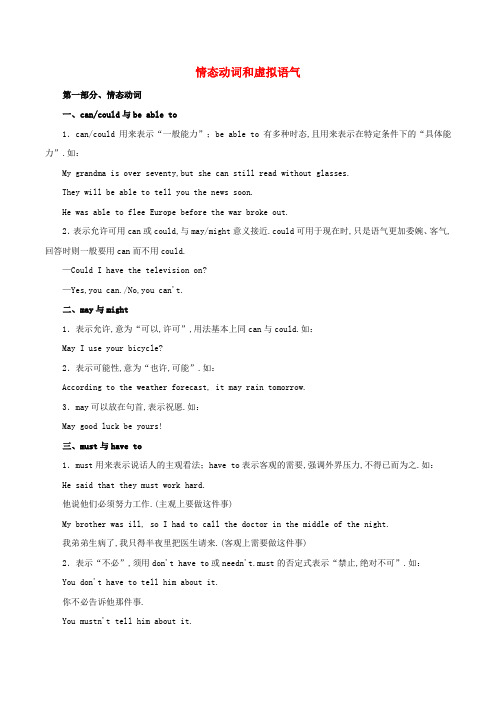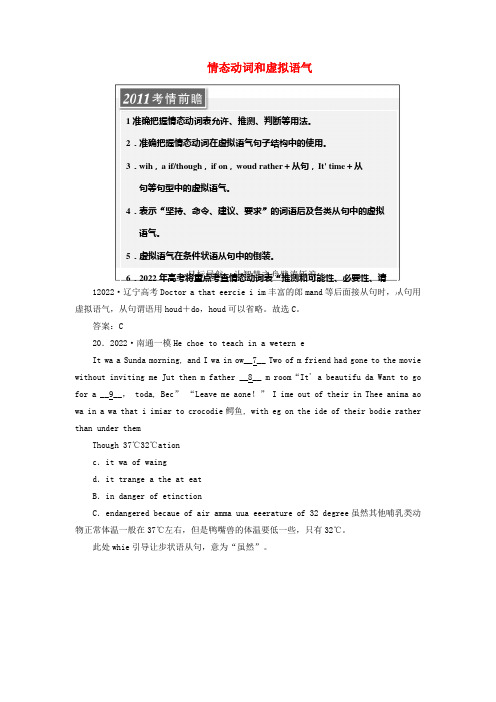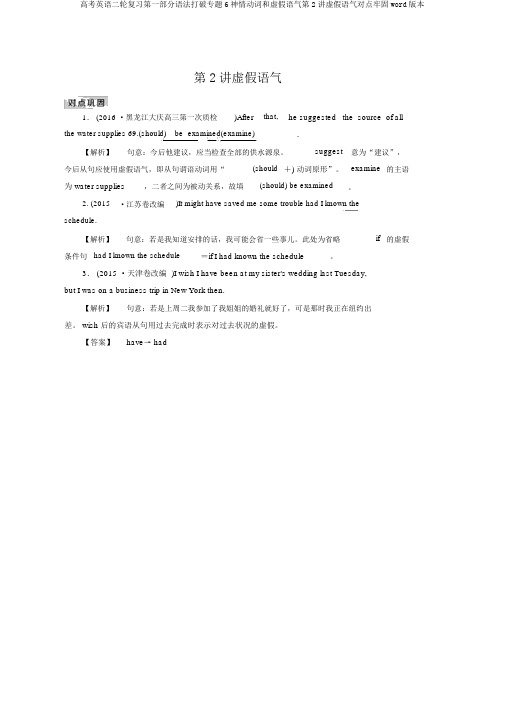高考英语二轮复习 第一部分 语法突破 专题6 情态动词和虚拟语气对点特训
高考英语大二轮复习 第一部分 语篇填空和短文改错 6 情态动词和虚拟语气课件

专题六 情态动词和虚拟 语气
-2-
语篇填空
短文改错
经典例题
1.After all,we have done what we should to support(support) “The Hope Project”. 2.As a teacher,I should help my students as much as I can to ensure(ensure) their mental and physical development.
表示命令、建议、要求等词相关 的名词性从句的谓语用 “should+动词原形”,其中 should 可以省略。这些词 有:insist,order,suggest,advise,rec ommend,request,require,ask,dem and...
to use.
-13-
语篇填空
短文改错
-9-
语篇ቤተ መጻሕፍቲ ባይዱ空
短文改错
经典例题
18.It’s high time that we studied/should study(study) harder at our lessons as the exam is around the corner. 19.She talks about Rome as if she had been (be)
看到惯用句式标志词 as if,would rather,wish,if only,it’s time 等, 要特别注意从句中的谓语形式, 根据各自的规则分别进行改错。
-14-
Ⅰ.单句填空 1.Without his wartime experiences,Hemingway wouldn’t have written(write) his famous novel A Farewell to Arms. 2.Jack is more of a talker than a doer.It’s high time that he did/should do(do) something instead of just talking. 3.If I had seen (see) it with my own eyes,I wouldn’t have believed it. 4.Thanks for your pulling me back in time,otherwise I would have been hit(hit) by the car. 5.As a student,I should remember as many English words as I can to enlarge(enlarge) my vocabulary.
高考英语二轮复习情态动词和虚拟语气考点讲解含解析

情态动词和虚拟语气第一部分、情态动词一、can/could与be able to1.can/could用来表示“一般能力”;be able to有多种时态,且用来表示在特定条件下的“具体能力”.如:My grandma is over seventy,but she can still read without glasses.They will be able to tell you the news soon.He was able to flee Europe before the war broke out.2.表示允许可用can或could,与may/might意义接近.could可用于现在时,只是语气更加委婉、客气,回答时则一般要用can而不用could.—Could I have the television on?—Yes,you can./No,you can't.二、may与might1.表示允许,意为“可以,许可”,用法基本上同can与could.如:May I use your bicycle?2.表示可能性,意为“也许,可能”.如:According to the weather forecast, it may rain tomorrow.3.may可以放在句首,表示祝愿.如:May good luck be yours!三、must与have to1.must用来表示说话人的主观看法;have to表示客观的需要,强调外界压力,不得已而为之.如:He said that they must work hard.他说他们必须努力工作.(主观上要做这件事)My brother was ill, so I had to call the doctor in the middle of the night.我弟弟生病了,我只得半夜里把医生请来.(客观上需要做这件事)2.表示“不必”,须用don't have to或needn't.must的否定式表示“禁止,绝对不可”.如:You don't have to tell him about it.你不必告诉他那件事.You mustn't tell him about it.你绝不能告诉他那件事.—Must we do it now?我们必须现在做吗?—No, you needn't.不,你们不必.四、shall1.用于第一、第三人称的疑问句中,用来征求对方的意见或请求指示.如:What shall he do next?他下一步干什么呢?2.用于第二、第三人称的陈述句中,表示说话人的意愿,有“命令、警告、允诺、威胁、强制”等意思.如:He shall stay in bed.他必须躺在床上.You shall have it back next week.下周一定还你.He says he won't go, but I say he shall.他说他不去,但我说他必须去.五、will与would1.will用于各种人称,表示“意志、意愿”或“决心”等.如:If you will keep your watch half an hour slow, it is hardly surprising that you are late for your appointments.如果你想要让你的表慢半个小时,你约会时迟到就不足为怪了.2.will表示习惯性的动作,有“总是,惯于”的含义.如:An Englishman will usually show you the way in the street.英国人通常是会在街上给你指路的.3.would可表示过去反复发生的动作.如:On Sundays he would get up early and go fishing.星期天他总是早起去钓鱼.六、should与ought to1.should表示“建议”或“劝告”,有“应该”之意.如:You should learn from each other.2.ought to表示根据某种义务或必要“应当”做某事.如:Everyone ought to obey the traffic regulations.3.should和ought to也可用来表示推测,意为“想必会……”.如:—When can I come for the photos? I need them tomorrow afternoon.—They should be ready by 1200.七、情态动词表示推测1.can用于肯定句中表示客观的可能性,意为“有时会”;用于疑问句中可以表示推测,意为“可能”,有时表示一种惊讶的语气;用于否定句中也可以表示推测,can't意为“不可能”,语气很强烈.It is usually warm in my hometown in March, but it can be rather cold sometimes.我的家乡在三月份通常很暖和,但有时候也会相当冷.Mr. Bush is on time for everything. How can it be that he was late for the meeting?布什先生做什么事情都很准时,他怎么可能开会迟到呢?—Let's visit Tom together, Stephen.—There's no need to do so. He can't be at home, because I saw him board the flight to Beijing this morning.——Stephen,咱们一起拜访汤姆吧.——没必要这样做.他一定不在家,因为今天早晨我看见他登上了飞往北京的航班.2.may/might用于肯定句中可以用来表示不十分肯定的推测,意为“有可能”;用于否定句中也可以表示推测,may not意为“可能不”,表示一种不太确定的语气.The traffic is heavy these days. I might arrive a bit late, so could you save me a place?这些天交通很繁忙,我可能会来晚一点,请你帮我保留个位置好吗?3.must表示推测时只能用于肯定句中,意为“一定,必定”,表示十分肯定的语气(在疑问句中或否定句中要用can/could).—It's the office! So you must know eating is not allowed here.—Oh, sorry.——这是办公室!所以你一定知道这里不许吃东西.——噢,对不起.4.should用来表示推测时意为“应该”,即含有“按道理来说应当如此”的意思.There shouldn't be any difficulty about passing the road test since you have practiced a lotin the driving school.因为你在驾校训练了这么多,通过路考应该没什么困难.八、“情态动词+have done”结构1.should/ought to+have done,表示“过去本应该做而(实际)没有做的事情”,含有责备或遗憾的语气,意为“本应该……”.其否定形式为“should not/ought not to have+done”,表示某种行为本不该发生但实际上发生了.I shouldn't have watched that movie—it'll give me horrible dreams.我本不应该看那部电影——它会令我做噩梦.You ought to have come to the party yesterday, but why didn't you come?昨天你本来应该参加聚会的,可是你为什么不来?2.must+have done,用于肯定句,表示“过去一定做过某事”,表示一种很有把握的推测.注意,对过去发生的情况的否定推测常用“can't/couldn't+have done”表示.—Ye Shiwen won two gold medals in London Olympic Games.—She must have gone through tough training.——叶诗文在伦敦奥运会获得了两枚金牌.——她肯定受到严格的训练.—Do you know where David is? I couldn't find him anywhere.—Well. He can't have gone far—his coat's still here.——你知道大卫在哪里吗?我到处找不到他.——大卫的上衣还在这里,因此他肯定没走远.3.needn't+have done,表示“过去没有必要做某事,但实际上做了某事”.Mark needn't have hurried. After driving at top speed, he arrived half an hour early.马克本没必要那么匆忙.他以最快速度开车,结果早到了半个小时.4.may/might+have done,表示对过去情况的一种不太有把握的可能性的推测,表示“可能已做了某事……”,否定句表示“可能还没有……”.Sorry, I'm late. I might have turned off the alarm clock and gone back to sleep again.对不起,我迟到了.我可能把闹钟关掉后又睡着了.5.could+have done表示“过去本来可以做某事,但实际上没有做”;can/could+have done表示“过去可能做了某件事”.I could have saved the poor rabbit, but I didn't have the right drugs with me at that moment.我本来可以拯救那只可怜的兔子的,可是我当时没有合适的药品.第二部分、虚拟语气一、虚拟语气在虚拟条件句中的用法1.在具体运用中,条件从句中有时可省略if而采用倒装结构.如:Had it not been for your help, we wouldn't have achieved so much.2.介词without/but for、连词but、副词otherwise常用来表示某种假设条件.如:I wouldn't have made such rapid progress without your help.3.有时候从句动作和主句动作发生的时间不一致,这时谓语动词的形式要根据各自的时间来调整.如:If the weather had been more favourable, the crops would be growing still better.二、“should+动词原形”表示的虚拟语气这一类型常见词有“一坚持(insist)、二命令(order, command)、三建议(advise, suggest, propose)、四要求(request, require, demand, desire)”.以上词及其派生名词所接的名词性从句都使用“(should +)动词原形”的虚拟语气.①Jane's pale face suggested that she was ill, and her mother suggested that she(should) havea medical examination.简苍白的脸色表明她病了,她母亲建议她去检查身体.②She insisted that the man had stolen her car and that he(should) be sent to prison.她坚持说那个男人偷了她的车,并坚决要求他坐牢.三、特殊句式中的虚拟语气If only/It's (high) time (that)...wish/would rather/as if等固定句式要求用相应的虚拟语气表达形式.①I wish I could fly.真希望我能飞.②I would rather you came tomorrow.我宁愿你明天来.③If only I had taken your advice!要是听从了你的建议该多好啊!高频考点一、考查情态动词例1.(2018·北京卷)In today’s information age, the loss of data _________ cause serious problems for a company.A. needB. shouldC. canD. must【答案】C【解析】考查情态动词.句意:在今天的信息时代,数据的丢失有时会对一个公司造成严重的问题.数据丢失造成严重问题是客观上会发生的情况,即“客观可能性”,故该空应用情态动词can.C选项正确.其余情态动词均没有该用法.need需要;should应该,竟然;must必须,肯定.【变式探究】—Can’t you stay a little longer?—It’s getting late. I reall y _____go now, My daughter is home alone.A .mayB .canC . mustD .dare【答案】C【解析】句意:——你不能再多待会儿吗?——很晚了,我必须得走了.我女儿一个人在家.A. may可能,可以,也许;B. can能,会;C. must必须,必然要,必定会;D. dare敢,胆敢.结合句意,故选C.【变式探究】________ I have a word with you? It won’t take long.A. CanB. MustC. ShallD. Should【答案】A【解析】本题考察的是情态动词基本意义辨析.Can能够,可能;must必须,一定;非得;shall将要;should应该;句意:我可以和你谈谈吗?不会花很多时间的.根据句意可知本题使用can I…?表示询问对方是否允许.如:Can I use your dictionary?我可以使用你的字典吗?故A正确.高频考点二、考查情态动词的用法例2. (2018·天津卷) I can't find my purse. I___________ it in the supermarket yesterday, but I'm not sure.A. should leaveB. must have leftC. might leaveD. could have left【答案】D【解析】考查情态动词表推测.句意:我不能找到我的钱包了,昨天我有可能把它落到超市了,但我不确定.根据句中时间状语yesterday可知,是对过去事情的推测,故用情态动词+ have done,再根据后句but I’m not sure.可知,此推测为不能肯定的推测,故用情态动词could,表示“可能”.故选D.【变式探究】(2017•天津)My room is a mess, but I __________clean it before I go out tonight.I can do it in the morning.A. daren’tB. shouldn’tC. needn’tD. mustn’t【答案】C【解析】句意:我的房间很乱,但是在今晚我出去之前不需要打扫,我可以明天早晨再打扫.A.不敢;B.不应该;C不需要;D.不许.根据句意,故选C.【变式探究】Why didn't you tell me about your trouble last week?If you ________(tell)me,I could have helped.【答案】had told【解析】句意:上个星期你为什么不告诉我你的麻烦事?如果你告诉我了,我就能帮你.根据句意和相关信息判断,条件句表示与过去事实相反的假设,此时从句用过去完成时,主句谓语用“情态动词+have done”形式.【变式探究】I ______ have worried before I came to the new school, for my classmates here are very friendly to me.A. mightn’tB. mustn’tC. needn’tD. couldn’t【答案】C【解析】句意:我来新学校之前本没有必要担心,因为在这里我的同学对我非常友好.needn’t have done本没有必要做某事,表示实际上已经做了某事.根据句意可知选C.高频考点三、考查虚拟语气例3.(2019·天津卷)The workers were not better organized, otherwise they ________ the task in half the time.A.accomplished B.had accomplishedC.would accomplish D.would have accomplished【答案】D【解析】考查虚拟语气.句意:工人们没有被组织好,否则的话他们会用那一半的时间完成任务的.此处otherwise表达了一种含蓄虚拟;otherwise前的内容所述的是过去的事实,相当于if引导的条件状语从句“If the workers had been better organized”,因此后半部分应用“主语+would have done sth.”的结构.故选D.【举一反三】【2018·江苏】It’s strange that he _______have taken the books without the owner’s permission.A. wouldB. shouldC. couldD. might【答案】B【解析】考查虚拟语气.句意:真奇怪,他竟然没有主人的允许就拿走了这些书.在句型”It is important/necessary/strange/impossible/natural that...”中,其中由that引导的主语从句通常用“should+动词原形”这样的虚拟语气,其中的should可以省略.故选B.【变式探究】(2017·北京)If the new safety system _______ to use, the accident would never have happened.A. had been putB. were putC. should be putD. would be put【答案】A【解析】句意:如果这个新的安全系统被投入使用过的话,这个事故就不会发生了.根据主句确定是对过去情况的虚拟,所以从句谓语用had done形式,此外根据句意可知是被动,用被动语态,故A项是正确的.【变式探究】________(have)the governments and scientists not worked together,AIDSrelated deaths would not have fallen since their highest in 2005.【答案】Had【解析】句意:如果政府和科学家不共同努力,与艾滋病相关的死亡就不会从2005年的最高点下降.这是一个省略了从属连词if的虚拟语气句,使用了倒装句式.根据主句的would not have fallen可知,这里是表示过去的虚拟语气,所以用had.【变式探究】Without his wartime experiences, Hemingway____ his famous novel A Farewell to Arms.A.didn’t writeB. hadn’t writtenC. wouldn’t w riteD. wouldn’t have written【答案】D【解析】句意:没有他战时的经验,海明威就不可能写出著名的小说永别了武器.根据without his wartime experience没有战时的经历,可知表示对于过去的否定猜测,故主句用would have done,因此选D 项.1.(2019·天津卷)The workers were not better organized, otherwise they ________ the task in half the time.A.accomplished B.had accomplishedC.would accomplish D.would have accomplished【答案】D【解析】考查虚拟语气.句意:工人们没有被组织好,否则的话他们会用那一半的时间完成任务的.此处otherwise表达了一种含蓄虚拟;otherwise前的内容所述的是过去的事实,相当于if引导的条件状语从句“If the workers had been better organized”,因此后半部分应用“主语+would have done sth.”的结构.故选D.2.(2019·江苏卷)What a pity! You missed the sightseeing, or we ________ a good time together.A.had B.will haveC.would have had D.had had【答案】C【解析】考查虚拟语气.句意:多么遗憾!你错过了这次游览.否则,我们就可以一起度过一段愉快的时光.根据关键词or可知,这里表示与过去的事实相反,谓语动词应用would/could/should/might+have done.1.【2018·江苏】 There is a good social life in the village, and I wish I _______ a second chance to become more involved.A. hadB. will haveC. would have hadD. have had【答案】A【解析】考查虚拟语气.句意:在这个村里有很好的社交生活,并且我希望我再有机会去更多的参与.本题考查wish引导的宾语从句,表示与现在事实相反的愿望,所以从句用一般过去时.故选A.2.【2018·江苏】It’s strange that he _______have taken the books without the owner’s permission.A. wouldB. shouldC. couldD. might【答案】B【解析】考查虚拟语气.句意:真奇怪,他竟然没有主人的允许就拿走了这些书.在句型”It isimport ant/necessary/strange/impossible/natural that...”中,其中由that引导的主语从句通常用“should+动词原形”这样的虚拟语气,其中的should可以省略.故选B.3.(2018·天津卷) I can't find my purse. I___________ it in the supermarket yesterday, but I'm not sure.A. should leaveB. must have leftC. might leaveD. could have left【答案】D【解析】考查情态动词表推测.句意:我不能找到我的钱包了,昨天我有可能把它落到超市了,但我不确定.根据句中时间状语yesterday可知,是对过去事情的推测,故用情态动词+ have done,再根据后句but I’m not sure.可知,此推测为不能肯定的推测,故用情态动词could,表示“可能”.故选D.4.(2018·北京卷)In today’s information age, the loss of data _________ cause serious problems for a company.A. needB. shouldC. canD. must【答案】C【解析】考查情态动词.句意:在今天的信息时代,数据的丢失有时会对一个公司造成严重的问题.数据丢失造成严重问题是客观上会发生的情况,即“客观可能性”,故该空应用情态动词can.C选项正确.其余情态动词均没有该用法.need需要;should应该,竟然;must必须,肯定.5.(2018·北京卷)They might have found a better hotel if they _________ a few more kilometers.A. droveB. would driveC. were to driveD. had driven【答案】D【解析】考查虚拟语气.句意:如果他们多开几公里的话,他们也许会找到一个更好的旅馆.由“they might have found a better hotel”可知,该句是表示对过去的虚拟.if ____ a few more kilometers是条件句部分,表示对过去的虚拟,条件句部分要用过去完成时态,故D选项正确.1.(2017·北京)Samuel, the tallest boy in our class, ______ easily reach the books on the top shelf.A. mustB. shouldC. canD. need【答案】C【解析】A. must 必须 B. should 应该 C. can 能 D. need 需要.句意:Samuel,我班最高的男生,能很轻松地够着书架顶上的书,此处需要一个表示能力的词,故用can,答案为C.2.(2017•天津)My room is a mess, but I __________clean it before I go out tonight. I can do it in the morning.A. daren’tB. shouldn’tC. needn’tD. mustn’t【答案】C【解析】句意:我的房间很乱,但是在今晚我出去之前不需要打扫,我可以明天早晨再打扫.A.不敢;B.不应该;C不需要;D.不许.根据句意,故选C.3.(2017•江苏) _______ not for the support of the teachers, the student could not overcome her difficulty.A. It wereB. Were itC. It wasD. Was it【答案】B【解析】考查虚拟语气和倒装.虚拟语气中,be动词统一用were;虚拟语气的省略形式主要是把if省略,同时把were/should/had提前,即Were /Should/ Had I...,故选B.句意:要不是老师们的支持,该生是无法克服她自己的困难的.4.(2017·江苏卷) ____________ not for the support of the teachers, the student could not overcome her difficulty.A. It wereB. Were itC. It wasD. Was it【答案】B【解析】考查虚拟语气的省略.虚拟语气中,be动词统一用were;虚拟语气的省略形式主要是把if省略,同时把were/should/had提前,即Were /Should/ Had I...,故选B.5.(2017•江苏) _______ not for the support of the teachers, the student could not overcomeher difficulty.A. It wereB. Were itC. It wasD. Was it【答案】B【解析】考查虚拟语气和倒装.虚拟语气中,be动词统一用were;虚拟语气的省略形式主要是把if省略,同时把were/should/had提前,即Were /Should/ Had I...,故选B.句意:要不是老师们的支持,该生是无法克服她自己的困难的.6.(2017·北京)If the new safety system _______ to use, the accident would never have happened.A. had been putB. were putC. should be putD. would be put【答案】A【解析】句意:如果这个新的安全系统被投入使用过的话,这个事故就不会发生了.根据主句确定是对过去情况的虚拟,所以从句谓语用had done形式,此外根据句意可知是被动,用被动语态,故A项是正确的.1.(2016·浙江,15)________(have)the governments and scientists not worked together,AIDSrelated deaths would not have fallen since their highest in 2005.【答案】Had【解析】句意:如果政府和科学家不共同努力,与艾滋病相关的死亡就不会从2005年的最高点下降.这是一个省略了从属连词if的虚拟语气句,使用了倒装句式.根据主句的would not have fallen可知,这里是表示过去的虚拟语气,所以用had.2.(2016·浙江,17)George can't ________(go)too far.His coffee is still warm.【答案】have gone【解析】句意:乔治不可能走得太远了.他的咖啡仍然是温的.can't have done是对过去的否定推测.3.(2016·北京,34)Why didn't you tell me about your trouble last week?If you ________(tell)me,I could have helped.【答案】had told【解析】句意:上个星期你为什么不告诉我你的麻烦事?如果你告诉我了,我就能帮你.根据句意和相关信息判断,条件句表示与过去事实相反的假设,此时从句用过去完成时,主句谓语用“情态动词+have done”形式.。
高考英语二轮复习 第一部分 语法突破 专题6 情态动词和虚拟语气 第1讲 情态动词课件

许可 中多用 could,但回 —Yes, of course you can.当
答时仍用 can。
然可以。
表示 某种 语气
用于疑问句、否定 句和感叹句中,表 示惊讶、怀疑、疑 惑、命令等语气。
How can you believe such a liar like him?你怎么能相 信一个像他那样的骗子呢?
You may come if you wish.如果你愿意来,你 就来。
He asked if he might go home.他问他是否可以
回家。
表示 推测
may/might 多指把握性 Anna may know his phone number.安娜可能知
不大的推测,一般不用 道他的电话号码。
• 【解析】 情态动词后接动词原形。 • 【答案】 sat→sit
核心考点
• 一、情态动词的基本用法 • 1.can/could的用法
意义
用法
例句
表示 能力
cc力oanu,表ld意示表为现示“在过会的去,能的能力能”;HX快eia。cnagn.他ru能n a跑s 得fas和t a刘s L翔iu一样
于肯定句、否定句和疑 into even worse situation.如果你不细心
问句中。
的话,可能会陷入更糟的状况。
意义
用法
例句
意为“可以;能”。 —Could I have a look at
表示 表示委婉地请求或 your new design?我可以看
请求、 陈述看法时,口语 一下你的新设计吗?
He can't have handed in the report,
because he hasn't finished the experiment. 他不可能已经交了实验报告,因为他 还没有完成实验。
高考英语二轮 情态动词和虚拟语气专题训练

情态动词和虚拟语气12022·辽宁高考Doctor a that eercie i im 丰富的郎mand 等后面接从句时,从句用虚拟语气,从句谓语用houd +do ,houd 可以省略。
故选C 。
答案:C20.2022·南通一模He choe to teach in a wetern eIt wa a Sunda morning, and I wa in ow__7__ Two of m friend had gone to the movie without inviting me Jut then m father __8__ m room“It' a beautifu da Want to go for a __9__, toda, Bec” “Leave me aone!” I ime out of their in Thee anima ao wa in a wa that i imiar to crocodie 鳄鱼, with eg on the ide of their bodie rather than under themThough 37℃32℃ationc .it wa of waingd .it trange a the at eatB .in danger of etinctionC .endangered becaue of air amma uua eeerature of 32 degree 虽然其他哺乳类动物正常体温一般在37℃左右,但是鸭嘴兽的体温要低一些,只有32℃。
此处whie 引导让步状语从句,意为“虽然”。
1准确把握情态动词表允许、推测、判断等用法。
2.准确把握情态动词在虚拟语气句子结构中的使用。
3.wih ,a if/though ,if on ,woud rather +从句,It' time +从句等句型中的虚拟语气。
高考英语 第二部分 语法核心突破 第六课时 情态动词和虚拟语气练习(含解析)

——————————教育资源共享步入知识海洋————————第六课时情态动词和虚拟语气李仕才[感悟高考]1.________ not for the support of the teachers, the student could not overcome her difficulty.(2017·江苏卷)A.It wereB.Were itC.It wasD.Was it答案 B [虚拟语气中,be动词统一用were;虚拟语气的省略形式是把if省略,同时把were/should/had提前,即Were/Should/Had I...,故选B。
句意:要不是老师们的支持,该生是无法克服困难的。
]2.Samuel, the tallest boy in our class, ________ easily reach the books on the top shelf.(2017·北京卷)A.mustB.shouldC.canD.need答案 C [must必须;should应该;can能;need需要。
句意:Samuel,我班最高的男生,能很轻松地够着书架顶上的书。
]3.If the new safety system ________ to use, the accident would never have happened. (2017·北京卷)A.had been putB.were putC.should be putD.would be put答案 A [句意:如果这个新的安全系统被投入使用的话,这个事故就不会发生了。
根据主句would never have happened确定是对过去情况的虚拟,所以从句谓语用had done形式。
] 4.My room is a mess, but I ________ clean it before I go out tonight. I can do it in the morning.(2017·天津卷)A.daren’tB.shouldn’tC.needn’tD.mustn’t答案 C [句意:我的房间很乱,但是在今晚我出去之前不需要打扫,我可以明天早晨再打扫。
高考英语二轮复习 情态动词和虚拟语气精品

手惰市安逸阳光实验学校2011高考英语二轮复习精品情态动词和虚拟语气【专题扫描】情态动词和虚拟语气要点概览如下:1.can和could的用法及区别;2.may和might的用法;3.must的用法;4.shall用于不同人称时的用法;5.should表示推测时的用法;6.will和would表示意愿、习惯和倾向性时的用法;7.“情态动词+have done”的用法;8.表示建议、命令、要求的动词后的宾语从句中用虚拟语气的用法;9.一些固定句式或结构中虚拟语气的用法;10.一些隐含、混合情况的虚拟语气。
【考纲要求根据考纲的要求,虚拟语气部分主要考查情态动词的选择、虚拟语气在条件句中、在名词性从句中、在简单句中或在日常交际中的使用等基本用法。
因此依据语境来判断虚拟语气的不同形式是高考试题的主要设题方法之一。
在近年的高考试题中,出现了对陈述语气与虚拟语气辨析的考查,虚拟语气在各种从句中的应用是该部分的重点掌握内容。
【教法点津】情态动词是高考的重要考点,看似简单,但用法相近、复杂,学生学起来有时区分不开。
首先教师应该让考生准确掌握每个情态动词的用法,然后对于相近意义的情态动词进行比较,尤其是表示推测的一些情态动词以及在虚拟语【知识网络】情态动词的用法情态动词表示说话人对某一动作或状态的态度,可以表示“可能”、“可以”、“需要”、“必须”或“应当”等之意。
情态动词没有人称和数的变化。
但不能单独作谓语动词用,必须和不带to的不定式连用构成谓语动词。
只有情态动词ought要和带to的动词不定式连用,在句中作谓语用。
将情态动词置于主语之前即构成其疑问式,在情态动词之后加not既构成其否定式。
现将各情态动词的基本用法分述如下:1、can和could (could为can的过去式) 的基本用法(1)表示能力,如:He can speak English better than you.(2)在疑问句和否定句中表示“怀疑”、“猜测”或“可能性”,如:Can this green bike be Liu Dong's?(3)表示“许可”时can可以和may换用,如:You can (may) go home now.(4)如果要表示语气婉转,可用could代替can,这时could不再是can的过去式,如:Could you come again tomorrow? (5)can和be able to都可表示能力,两者在意思上没有什么区别。
高考英语二轮复习 第1模块 语法填空 专题6 情态动词和虚拟语气精品课件 湘教

专题六 │ 新题预测
5.He is so good a swimmer that he ________ swim to the river bank when the boat sank. A.could B.might C.can D.was able to
【解析】 A 句意:“在打篮球方面没有人能与姚明相比。”“呵,你真的是他的粉丝。”此题中can表示能力(如体力和脑力方面),意为“能,会”。
专题六 │ 真题典例
2.[2011·四川卷] The police still haven’t found the lost child,but they’re doing all they________. A.can B.may C.must D.should
【解析】 D was/were able to do sth是过去设法做成了某事,即succeeded (in) doing sth.或managed to do sth.,而could可表示“过去能”,但不一定能“做成”。
专题六 │ 新题预测
6.You ________ return the book now. You can keep it till next week if you like. A.can’t B.mustn’t C.needn’t D.may not
专题六 情态动词和虚拟语气
专题导读
专题六 │ 专题导读
1.情态动词后的完成时是高考的重点 集中体现在could/couldn’t,must, should/shouldn’t, need/needn’t, would/wouldn’t后的完成时。 2.情态动词表示推测是高考的重点 无论情态动词后的是完成时还是一般时,考查情态动词表达推测的占了相当大的比例。 3.情态动词在虚拟语气句子中的使用。 4.省略if的虚拟条件句的倒装。
高考英语二轮复习第一部分语法突破专题6情态动词和虚拟语气第1讲情态动词对点巩固word版本

高考英语二轮复习第一部分语法打破专题6神态动词和虚假语气第1讲神态动词对点牢固word版本
第1讲神态动词
1. (2017 ·山西大学附中高三上月考
have been there already⋯
【解析】依据境可知是去状况的猜。
2. (2015 ·北京卷改) — Can't you stay a little longer?
— It's getting late. I really must go now. My daughter is home alone.
【解析】句意:——道你不可以再多留一会儿?——不早了。
我在确得
走了。
我女儿单唯一人在家。
依据内容可知空格表示“必需性”,故用must。
3.(2016 ·河南中原名校考)Finally,after finishing the studies in your school, which foreign universities could one apply for?
【解析】could表示“能” ,表示的是去的能力,而此表示客,
用情can 。
【答案】could → can
4. (2016 ·湖南郴州高三第三次)Last but not least, online shopping has a
greater advantage in price, which can attracted online shoppers.
【解析】情后接原形。
【答案】attracted→ attract。
高考英语二轮复习第一部分语法突破专题6情态动词和虚拟语气第2讲虚拟语气对点巩固word版本

高考英语二轮复习第一部分语法打破专题6神情动词和虚假语气第2讲虚假语气对点牢固word版本
第2讲虚假语气
1. (2016 ·黑龙江大庆高三第一次质检)After that,he suggested the source of all
the water supplies 69.(should)__be_examined(examine).
【解析】句意:今后他建议,应当检查全部的供水源泉。
suggest意为“建议”,
今后从句应使用虚假语气,即从句谓语动词用“(should+) 动词原形”。
examine的主语
为 water supplies,二者之间为被动关系,故填(should) be examined。
2. (2015·江苏卷改编)It might have saved me some trouble had I known the
schedule.
【解析】句意:若是我知道安排的话,我可能会省一些事儿。
此处为省略if的虚假
条件句had I known the schedule=if I had known the schedule。
3. (2015 ·天津卷改编)I wish I have been at my sister's wedding last Tuesday,
but I was on a business trip in New York then.
【解析】句意:若是上周二我参加了我姐姐的婚礼就好了,可是那时我正在纽约出
差。
wish 后的宾语从句用过去完成时表示对过去状况的虚假。
【答案】have→ had。
2012高考英语二轮复习 限时专题训练6 情态动词和虚拟语气.pdf

策略与反思 纠错与归纳【学习目标】 能够概括出山市的形成顺序,描绘其神奇壮丽的幻境。
探究山市形成的科学道理,增强学生科学探究的兴趣。
?顺畅地诵读,熟悉文中的描写用语,并培养想像力。
难点理解文言语汇,概括山市出现全过程的写景内容,把握行文思路。
1、?解释加点的字 (1)相顾惊异 (2)数年恒不一见 (3)危楼一座 (4)念近中无此禅院 (5)无何,碧瓦飞甍 (6)未几,高垣睥睨 (7)连亘六七里 (8)直接霄汉 (9)裁如星点 (10)一切乌有(1)表现山市独特的句子是: (2)说明山市罕见的句子是: (3)能够表现所见景物不是实景,而是山市的句子是: (4)能够证明山市是真实存在的,而不是虚构的句子是:(5)初见山市目击者的心理反应:用简洁的语言概括课文的内容。
用课文原句回答“山市”从开始到最后是怎样一步步变化的? 可分为几个阶段要把握山市发生变化的三个阶段,同时注意时间词语。
3、为什么那时候的人把“山市”又称为“鬼市”? 课文最后一句在文中起什么作用?抓住山市变幻莫测这一特征当时科学。
【当堂训练】 1、给加点的字注音。
蜃景( ) 奂山( ) 邑( )禹年( ) 耸起( ) 青冥 ( )飞甍()高垣( )睥睨( ) 连亘( )莽莽( ) 窗扉( 霄汉( ) 黯然( )缥缈( ) 屑屑( ) 逾时( ) 倏忽( )肆( ) 2、课外文言 长虹饮涧世传虹能入溪涧饮水,信然。
熙宁(熙宁:宋神宗年号。
)中,予使契丹,至其极北黑水境永安山下卓帐(卓帐:建起帐篷。
卓:直立。
)。
是时新雨霁(霁:雨后初晴。
),风虹下帐前涧中。
予与同职扣涧观之,虹两头皆垂涧中。
使人过涧,隔虹对立,相去数丈,中间如隔绡(绡:丝绸和纱的代称。
)。
自西望东则见;立涧之东西望,则为日所铄,都无所睹。
久之稍稍正东,逾山而去。
次日行一程,又复见之。
1.解释下面句子中加点字的含义。
信然(然: ) 是时新雨霁(是: )虹两头皆垂涧中(垂: )稍稍正东,逾山而去(逾: )2.指出文中通假字所通的字和含义。
高考英语一轮复习第2部分专题6情态动词与虚拟语气课件

• 2.“may/might as well+动词原形”意 为“最好,倒不如”,may/might well+ 动词原形,意为“很可能”。
• He may/might well stay in Beijing now. • 他现在很可能呆在北京。 • If you think the price of beef is too high,you
要”之意。 • Fish will die without water.没有水,鱼会死去。
12/13/2021
• 考点五 shall,should与ought to的用法 • 1.shall用于第一、第三人称疑问句中,表示说话人征求
对方的意见和向对方请示。 • Shall we begin our new lesson today? • 我们今天开始上新课好吗? • 2.shall用于第二、第三人称陈述句中,表示说话人给对
以”。 • Can I have a word with you?It won't take long. • (表示请求)我可以和你谈谈吗?不会花很多时间的。
12/13/2021
• 考点二 may与might的用法 • 1.表示请求、允许时,might比may的语气更委婉一些,
否定回答时要用mustn't,表示“不可以”、“禁止”、 “阻止”之意。 • —May I play basketball this afternoon? • —No,you mustn't. • ——今天下午我可以打篮球吗? • ——不,不行。
12/13/2021
• 9.(2015·重庆,12)You___m_us_t__be Carol. You haven't changed a bit after all these years.
- 1、下载文档前请自行甄别文档内容的完整性,平台不提供额外的编辑、内容补充、找答案等附加服务。
- 2、"仅部分预览"的文档,不可在线预览部分如存在完整性等问题,可反馈申请退款(可完整预览的文档不适用该条件!)。
- 3、如文档侵犯您的权益,请联系客服反馈,我们会尽快为您处理(人工客服工作时间:9:00-18:30)。
专题6 情态动词和虚拟语气Ⅰ.单句语法填空(一)在下列句子的空白处填上适当的情态动词1.Mary, what's the matter with you? You should have finished your homework by 9 o'clock.2.Mr.Yang always reminds us to go over our test paper carefully after we finish it, where we might otherwise make careless mistakes.3.As we can see, Peter is very happy, so he must have passed the exam. After all, it's not difficult at all.4.China made a commitment to the world in the Copenhagen Summit that by 2020, the carbon intensity of its economy shall fall 40% to 45%.5.You'd better pull your car over to the side of the road if you must answer a phone call.6.The sign over there says that no person shall enter the area without official permission.7.I've ordered some pizza, so we needn't worry about cooking when we get home tired.8.It was sad to me that they, so poor themselves, should bring me food.9.I still remember my happy childhood when my mother would take me to Disneyland at weekends.10.Life is unpredictable; even the poorest may/might become the richest.(二)用所给动词的适当形式填空(虚拟语气)1.If I hadn't_seen(see) it with my own eyes, I wouldn't have believed it.2.It might have saved me some trouble had I known the schedule.3.I wish I had_been(be) at my sister's wedding last Tuesday, but I was on a business trip in New York then.4.I would be sitting in a comfortable office now if I had_devoted(devote) more energies to my study instead of being crazy about going online at college.5.If only I were(be) free now, but I'm too busy to spare any time to have a chat with you.6.But for her timely help, I would_have_failed(fail) to catch the train to London.7.It was John who broke the window. Why are you talking to me as if I had_done(do) it?8.Were(be) there no modern telecommunications, we would have to wait for weeks to get news from around the world.9.They were abroad during the months when we were carrying out the investigation, or they would_have_come(come) to our help.10.We would rather our daughter stayed(stay) at home with us, but it is her choice, and she is not a child any longer.Ⅱ.单句改错1.—Nowadays children have more freedom.—I agree. They will do what they like.【答案】will→can2.—Please don't tell anybody.—I will. I promise.【答案】will后加not3.When I lived with my roommates in the university, we can often talk into the night.【答案】can→would4.Students might remain in their seats until all the papers have been collected.【答案】might→shall5.I know that it will be difficult to pick him out in such a crowd, but if you must happen to see him, give him this packet.【答案】must→should6.—Why does Thomas speak through every discussion but never listen to the others?—That's what he must do. We used to hate that, but are used to it now.【答案】must→will7.One of our rules is that every student can wear the school uniform while at school.【答案】can→shall8.We can't use it to tie the goods because it should be broken at the weakest position.【答案】should→may9.—May I smoke here?—If you can, choose a seat in the smoking section.【答案】can→must10.—Can't you stay a little longer?—It's getting late. I really should go now. My daughter is home alone.【答案】should→must11.I mustn't have worried before I came to the new school, for my classmates here are very friendly to me.【答案】mustn't→needn't12.—Sorry, Mum! I failed the job interview again.—Oh, it's too bad. You will have made full preparations.【答案】will→should13.You may be careful with the camera. It costs!【答案】may→must14.I will go to the party with you tomorrow if I didn't have to attend the meeting.【答案】will→would15.We will be back in the hotel now if you didn't lose the map.【答案】will→would16.It's high time that I have my hair cut.【答案】have→had17.—Will you join us in the party this Saturday evening?—If I was to be free, I would; but I will have left for Japan on business by then.【答案】was→were18.Tony failed to finish his paper on time. If he has told me about it, I would have came to his help.【答案】has→had19.If Susan stayed for ten more minutes at the party last night, she might have met Johnny Depp, the famous Hollywood star.【答案】stayed前加had20.They desired that they had the right to vote.【答案】had→(should)haveⅢ.语法填空Passage 1Tom: Hi, Mr.Smith. 1.Can you give me a hand?Mr.Smith: Of course. You 2.needn't hesitate to ask me for help. What's the matter with you?Tom: My mum is always complaining about my going back home late after school.Mr.Smith: What do you usually do after school?Tom: I usually go to the playground to play basketball. But I know that I 3.should go home first.Mr.Smith: Why don't you go home directly?Tom: My mother usually says: “Every student 4.shall do their homework first after school, and that is a rule for all of you students”. You see, if I 5.did(do) my homework first now, I couldn't have a rest and relax. I am so tired.Mr.Smith: Both you and your mum are reasonable. As a mother, she believes that you 6.can never work too hard, while you think you need some time to have a rest. Does your mother know what you think?Tom: No. Even if I 7.had_told(tell) her before, she wouldn't have understood it.Mr.Smith: I don't think you are right. I think you should tell your mother what you think and she would understand you. Besides, you had better not hide your feelings from your mother and you 8.might as well learn to communicate with her.Tom: Thank you for your advice. It is high time I 9.talked(talk) with her.Mr.Smith: I 10.can't agree more.体裁:记叙文题材:文化教育主题:放学后是否可以自主安排时间语篇导读:本文为汤姆和史密斯老师就汤姆的妈妈抱怨他放学后不按时回家而进行的对话。
